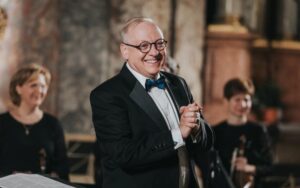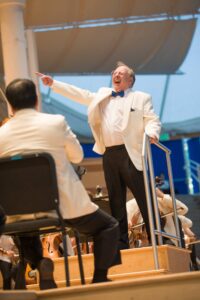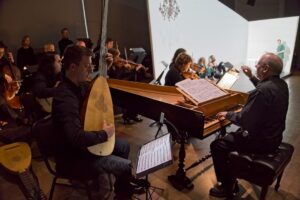Interview with Nic McGegan, Conductor of "L'Allegro"

Hailed as “one of the finest baroque conductors of his generation” (Independent) and “an expert in 18th-century style” (New Yorker), Nic McGegan makes his Curtis debut in November, leading a phenomenal cast of rising young opera singers and musicians in two performances of George Frideric Handel’s theatrical oratorio, L’Allegro, il Penseroso ed il Moderato.
While a performance of L’Allegro might be deemed a rare theatrical event compared to a presentation of Messiah, Water Music, Alcina, or Giulio Cesare, what do you think is most remarkable about this particular work in Handel’s catalogue and within the baroque repertoire?
Well, in terms of Handel, it’s an unusual piece in much the same way as Messiah is an unusual piece. Normally, Handel is writing an oratorio or an opera about characters—Julius Caesar or Samson. In other words, they’re either secular or sacred dramas. The difference between those works and L’Allegro and Messiah is that they don’t have characters. They’re non-narrative oratorios if you like. I suppose you could say Messiah‘s a narrative in the grandest sense. But unlike, say, the Matthew Passion, Christ doesn’t appear. In the case of L’Allegro, it’s more sort of “philosophy.” It’s about how to live a good life. It’s very Buddhist in that the middle way is the thing to seek. In other words, it’s not telling a story as such.

Another difference between L’Allegro and almost all other Handel works is that it’s based on a wonderful piece of poetry. Usually, opera librettos, and very often oratorios, are not the greatest verse. They’re not put together by world-famous poets. In the case here, you’ve got Milton, an extraordinary 17th-century poet whose poetry is very well known to the audience then, perhaps more so than now, together with Handel’s music. There are a couple of exceptions where Handel is setting the poetry of [John] Dryden in the Ode for St. Cecilia’s Day and Alexander’s Feast, but they are very much the exceptions.
Yet another unusual thing is that it is a very English work. In other words, when Milton writes about bells and things, Handel imitates English village church bells, playing the octaves in all the different orders that happen. You’ve got country dancing. You’ve got [mentions of] going to the theater and talking about Shakespeare.
In what historical context was the piece composed?
Most of Handel’s music up to that point in his life in the early 1740s had been largely Italian-based. He had written three or four of what you might call dramatic oratorios. But here, I think you could say, he’s in an experimental mood, looking towards the second half of his career, one that would eventually be amazingly successful.
In the five years running up to the composition of L’Allegro, Handel is definitely uncertain as to what he should be doing. The opera companies are failing. He’s lost a lot of money and is very nearly bankrupt. He’s also in bad health, and it’s possible he had a stroke. So, he’s trying his hand at oratorio and these famous English poems. He’s writing Concerti Grossi—I think he wrote all twelve of them in one month—because when he worked, he worked very hard. And he’s working in the background with Charles Jennens, the librettist who put Messiah together, who wrote the terrific libretto of the oratorio Saul. I would say that Jennens is the missing person here because we don’t give him nearly enough credit for putting together two separate poems and interleaving them to get the maximum contrast between them.
 There is “L’Allegro,” the party boy, and “il Pensiero,” the melancholy one who sits at home and reads long novels and thinks. They both have their problems, which is why you have the “Moderato,” which is Jennen’s contribution—don’t overdo it in either direction, and then you’ll be happy. Handel does a very neat trick in the final chorus because if you’re going to have something called “Moderato,” you can’t really have it either in the major or the minor, so it’s actually in a mode, neither the major nor the minor.
There is “L’Allegro,” the party boy, and “il Pensiero,” the melancholy one who sits at home and reads long novels and thinks. They both have their problems, which is why you have the “Moderato,” which is Jennen’s contribution—don’t overdo it in either direction, and then you’ll be happy. Handel does a very neat trick in the final chorus because if you’re going to have something called “Moderato,” you can’t really have it either in the major or the minor, so it’s actually in a mode, neither the major nor the minor.
The “Moderato” was often cut after the first performance. It’s not Milton’s verse, but it contains one of Handel’s greatest duets for, surprisingly, soprano and tenor, a more normal sort of duet for later in the 18th and 19th centuries. Usually, duets in Handel’s day are for two high voices and occasionally for two low voices but this one is enormously, elaborately written to a rather impenetrable text, but that didn’t seem to stop Handel.
What do you think was the impetus behind Handel setting the duets for soprano and tenor?
He has a great skill in making an act or a character in a piece much more interesting than perhaps they should be. In this case, the language is slightly complicated during “As steals the morn”. It doesn’t matter because you’re beguiled by this absolutely gorgeous music, which is amongst the most richly scored in the whole piece. Scoring is, of course, another thing that Handel is able to do here in this oratorio because it’s not dramatic. He can cloak or clothe, if you like, each aria with a special sound. The bird obviously gets a flute; there’s a hunting horn with imitations of English hunting calls. He wouldn’t be able to do that if it were a dramatic oratorio.
 L’Allegro seems to take on a different character and energy with each new performance, depending on how it is presented. You’ve conducted this work multiple times over the years and collaborated with various creative teams to breathe new life into it. What do you look forward to most about Curtis’s production?
L’Allegro seems to take on a different character and energy with each new performance, depending on how it is presented. You’ve conducted this work multiple times over the years and collaborated with various creative teams to breathe new life into it. What do you look forward to most about Curtis’s production?
Well, first of all, it’s great to be able to collaborate with others. I’ve done the Mark Morris production many times. I gave the American premiere of it, but that production was already completely formed when they did it [in 1988] at the Théâtre Royal de la Monnaie in Brussels. My job was to conduct what was already decided upon.
The nice thing here is that Chas and I will work through it. He’s got his ideas, and I may have a few, but we will put it together as an ensemble. I’m intrigued by the idea that it will be done with singers on the stage. I’ve done it as a concert almost as often as I’ve done it with Mark Morris and dancers. Here, we have about a dozen singers who will each have a solo—some more than one—and then they will also form the chorus.
For the people who are lovers of Handel, I think they’re going to be amazed by a piece that doesn’t receive that many performances and is so different from a Messiah or a Giulio Caesare. It’s got humor. It’s got a giggling chorus in it, for example. I mean, that’s not quite what you expect. It’ll be lovely for them to see the sheer contrast in the music and, in a funny way, how un-baroque it is. It’s very different from Vivaldi. It doesn’t have huge amounts of superfluous coloratura, and one of the reasons is that you’ve got fabulous texts to get across. It’s one of my favorite pieces of music.
 Curtis’s students (orchestral and vocal) are in for quite a treat to rehearse and perform this work with you. What do you hope they will gain from the experience, and what excites you most about working with these talented young musicians?
Curtis’s students (orchestral and vocal) are in for quite a treat to rehearse and perform this work with you. What do you hope they will gain from the experience, and what excites you most about working with these talented young musicians?
Well, it’s always exciting to work with students. I generally find I learn more than I teach. That’s really what it’s all about because the students ask questions and make you think. Very often, I might start rehearsing it on a Monday or Tuesday with the choir, and we’d have performances on Friday and Saturday. I’m going to be [at Curtis] for a couple of weeks working, delving into the piece much more deeply than I would be able to do in a professional setting. I hope we can experiment a bit—find different ways of doing things that suit particular singers. With a student at the start of his/her career who maybe hasn’t found out all that they can do yet, we can push the envelope slightly.
Visit Nic McGegan’s official website and read his full biography HERE.
Interview with Mr. McGegan by Ryan Scott Lathan.
CURTIS OPERA THEATRE: L’ALLEGRO, Il PENSEROSO ED IL MODERATO
Handel’s Glorious Pastoral Ode of Darkness and Light
November 10, 2023 | Friday at 7:30 p.m.
November 12, 2023 | Sunday at 2:30 p.m.
Philadelphia Film Center, 1412 Chestnut Street
Click HERE for more information.
Photo Credits: 1.) Portrait of Nic McGegan by Dario Acosta 2.) Nicholas McGegan at the Haydneum Festival of Sacred Music Credit Pilvax Films. 3.) Photo by Dario Acosta. 4.) Image courtesy of Nicholas McGegan’s official Facebook page. 5.) Image courtesy of the Philharmonia Baroque Orchestra & Chorale. 6.) Photo by Laura Barisonzi.


